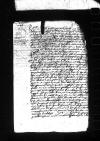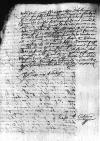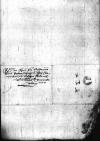List #870
Ioannes DANTISCUS do Piotr TOMICKILöbau (Lubawa), 1532-12-29
Rękopiśmienne podstawy źródłowe:
Publikacje:
| ||||||||||||||||||
Tekst + aparat krytyczny + komentarzZwykły tekstTekst + komentarzTekst + aparat krytyczny
 BNW BOZ TG 16 nr 1842, f. 8v
BNW BOZ TG 16 nr 1842, f. 8v
Reverendissimo in Christo Patri et Domino,
 BNW BOZ TG 16 nr 1842, f. 7r
Reverendissime in Ch stain⌈[Ch]Ch stain⌉risto Pater et Domine, domine mi Colendissime paper damaged⌈[ndissime]ndissime paper damaged⌉. Obsequiorum stain⌈[rum]rum stain⌉ meorum plurimam commendationem.
BNW BOZ TG 16 nr 1842, f. 7r
Reverendissime in Ch stain⌈[Ch]Ch stain⌉risto Pater et Domine, domine mi Colendissime paper damaged⌈[ndissime]ndissime paper damaged⌉. Obsequiorum stain⌈[rum]rum stain⌉ meorum plurimam commendationem.
Hodie paper damaged⌈[ie]ie paper damaged⌉ scripserunt mihi exactores contributionis quodammodo paper damaged⌈[ammodo]ammodo paper damaged⌉ mandantes, ut pro festo Sanctae Priscae[1] omnibus meis paper damaged⌈[s]s paper damaged⌉ ecclesiasticis mandarem, ut se huc conferrent et eis paper damaged⌈[eis]eis paper damaged⌉ de impositione contributionis responderent, itidem facerem et nobilitati, et plebeis, comminantes, nisi ita disponerem omnia, alios etiam in terra Cul paper damaged⌈[l]l paper damaged⌉mensi non contributuros. Hanc audaciam a domino
Dominatio Vestra Reverendissima suscepit quandam affinem meam viduam Gdanensem in clien  BNW BOZ TG 16 nr 1842, f. 7v telam suam, nomine
BNW BOZ TG 16 nr 1842, f. 7v telam suam, nomine
Parcat, quaeso, mihi Dominatio Vestra Reverendissima, quod semper meis querelis et fere perpetuis sum molestior. Ad neminem enim, quam ad Dominationem Vestram Reverendissimam confugere possum tutius. Cui me ex corde humiliter commendo.
Ex
Reverendissimae Dominationis Vestrae devinctissimus


